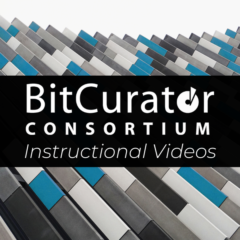
Using the BitCurator Reporting Tool: Part 1
BitCurator Consortium
This video provides a brief overview of using the BitCurator Reporting Tool in the BitCurator Software Environment. BitCurator Software version 2.0.6 is demonstrated in this video.

This video provides a brief overview of using the BitCurator Reporting Tool in the BitCurator Software Environment. BitCurator Software version 2.0.6 is demonstrated in this video.

This video provides a brief overview of using the BitCurator Reporting Tool in the BitCurator Software Environment. BitCurator Software version 2.0.6 is demonstrated in this video. Part 1 of Using the BitCurator Reporting Tool: https://youtu.be/6A4iDWzzEWo

This video provides a brief overview of using pyExifToolGUI to view, edit, and export metadata from image files in the BitCurator Software Environment. BitCurator Software version 2.0.6 is demonstrated in this video.

This video provides a brief overview of the BitCurator Software Environment interface. This content is shared for reuse with a Creative Commons Attribution-NonCommercial-ShareAlike (4.0) license.

This video provides a brief overview of the downloading and installing the BitCurator Software Environment as a virtual machine. BitCurator Software version 2.0.6 is demonstrated in this video.

This video provides a brief overview of setting up shared folders in the BitCurator Software Environment. BitCurator Software version 2.0.6 is demonstrated in this video.
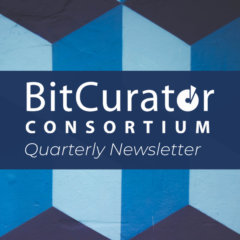
The latest issue of the BCC’s newsletter is now available! It includes: BitCurator Users Forum Call for Proposals New BCC members Updates from the BitCuratorEdu project Featured resources, including the recording of the BCC roundtable
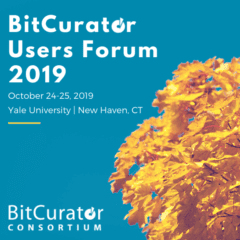
The BitCurator Consortium (BCC) invites proposals for the 2019 BitCurator Users Forum, to be held October 24-25, at Yale University. An international, community-led organization with 42 member institutions, the BCC promotes and supports the application of digital forensics tools and practices in libraries, archives, museums, … Read more →
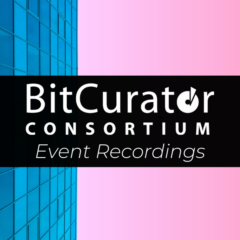
In the Spring and Fall of 2019, the BitCurator Consortium (BCC) will facilitate a series of online roundtable discussions on topics of interest for born-digital cultural heritage communities. Our first round-table took place on March 22 and explored “The Ethics of Born-Digital Collecting.” We were … Read more →
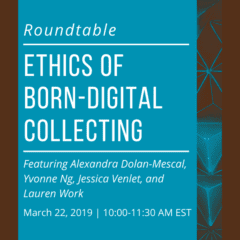
In the Spring and Fall of 2019, the BitCurator Consortium (BCC) will facilitate a series of online roundtable discussions on topics of interest for born-digital cultural heritage communities. Our first round-table took place on March 22 and explored “The Ethics of Born-Digital Collecting.” We were … Read more →

The BitCurator Consortium (BCC) is excited to announce that the 2019 BitCurator Users Forum will be held October 24-25, 2019, on the campus of BCC member Yale University. We are delighted to be hosting the BitCurator Users Forum in the northeast and look forward to … Read more →

The latest issue of the BCC’s newsletter is now available! It includes: Winter membership special BCC roundtable discussions BCC testimonials New BCC members Featured resources
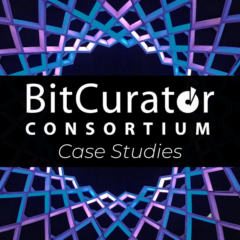
The RAND Corporate Archives serves as the organization’s corporate memory. The Archives collects, preserves, organizes and provides access to materials that document RAND’s story, people and impact from 1948 to the present. Within the archives is the Willis H. Ware Digital Collection (donated by the … Read more →

BitCurator: Beyond Environment This is a modified version of “BitCurator: Beyond Environment,” a talk I delivered remotely at the BitCurator Users Forum 2018, “Living on the Edge: Extending Digital Forensics into New Sectors.” The slides, with notes, are available through the community shared presentation and … Read more →
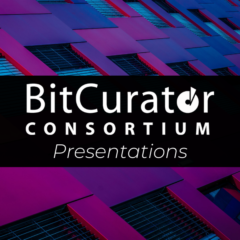
How reliable are our forensic tools? Working with born digital files requires the use of various tools, and there is an expectation that the software will perform as advertised. The tools do not always work properly, but problems are usually apparent in the form of … Read more →

Communities of Practice: Building a Foundation for Born-Digital Processing When I arrived at UNC Wilson Special Collections Library in 2016, newly hired in a digital archivist role, I found that roles for born-digital processing work were complex and distributed. This led me to start thinking … Read more →

A practical approach to working with proprietary file formats At The New York Public Library, archival collections increasingly contain proprietary file formats related to music and video editing, desktop publishing, and design and drafting software programs. This presentation will discuss approaches the Digital Archives Program … Read more →

This panel will discuss the substantial findings and documentation produced in the first year of the OSSArcFlow project, a collaborative effort of the Educopia Institute, the University of North Carolina at Chapel Hill School of Information and Library Science (UNC SILS), LYRASIS, and Artefactual, Inc. … Read more →

At the DLF Forum 2017, members of the DLF Born-Digital Access Group held a working lunch and discussed issues related to preparing and providing access to born digital archival materials. Following that meeting, a subset of the group formed to create, as one of its … Read more →

Several incidents in recent years have demonstrated the necessity of digital preservation in the media: the deletion of the Gothamist, DNAinfo, and LAist sites, and the battle for ownership of Gawker’s content have made it clear that, although journalists and information professionals are in agreement … Read more →